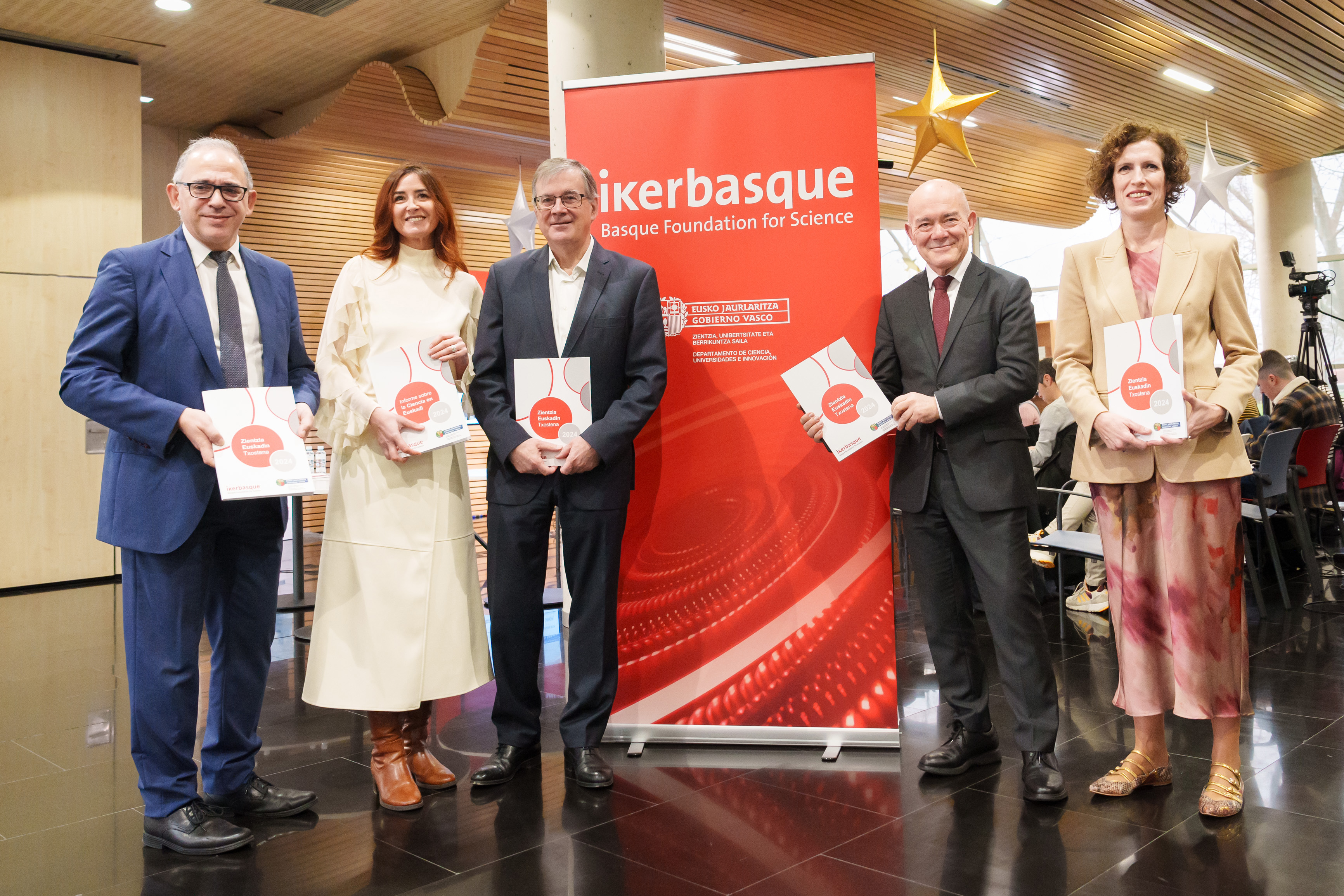
This morning, the Science in the Basque Country 2024 Report was presented at the CIC nanoGUNE headquarters. Participants in the presentation included the Basque Government’s Minister of Science, Universities, and Innovation, Juan Ignacio Pérez Iglesias, the Director of Research Amaia Esquisabel, the Director of University Policy and Coordination Sara Urionabarrenetxea, and the Scientific Director of Ikerbasque, Fernando Cossio.
The report highlights the key results achieved in the Basque Country in terms of research personnel, science funding, scientific outcomes, and technology transfer based on the indicators monitored by Ikerboost, the Basque Science and Technology Observatory.
Download the Science in the Basque Country 2024 Report (spanish)
Download the Science in the Basque Country 2024 Report (basque)
Key Findings on Scientific Production
Analyzing the impact of research work over the past year, the report underscores that in 2023, the Basque Country exceeded 8,000 scientific publications. This marks a 25% increase compared to the output five years ago (2018). Furthermore, the quality of research output has significantly improved: 60% of the Basque Country's scientific production was published in top-quartile journals (the most prestigious), representing a 33% growth over the last five years.
The report also highlights the growing internationalization of scientific production, which has increased by nearly 15 percentage points over the last decade, rising from 40% of publications with international collaboration in 2011 to 54% in 2023. In this international collaborations, researchers from the Basque Country often played prominent roles, frequently as lead authors. Collaborations include partnerships with leading global science producers, such as the United States, Germany, the United Kingdom, France, and Italy, as well as renowned research institutions like France's CNRS and the universities of Oxford and Cambridge.
Investment and Economic Returns
According to the latest data from Eustat, 2022 marked a record year for R&D investment in the Basque Country, approaching €1.8 billion for the first time in history, a 9% increase from the previous year. (Recently, Eustat released preliminary data for 2023, estimating investment at €2.002 billion.) This represents an investment of over 2.2% of GDP, placing the Basque Country as the leading autonomous community in Spain for R&D investment.
Additionally, the Basque Country leads Spain in per capita returns from the European Horizon Europe program, securing over €162 million in 2023, with a cumulative €400 million for the 2021–2023 period. Horizon Europe is a key tool for EU research and innovation activities. Notably, ERC grants from the European Research Council support researchers of any nationality and age pursuing cutting-edge research. These grants, recognized internationally for their rigorous evaluation process, serve as a benchmark of excellence. To date, 53 ERC projects have been developed in the Basque Country, with a record of 24 ERC projects underway in 2024.
Sectoral Contributions and Research Fields
The Basque universities account for over 65% of the region’s total scientific production, driven by the University of the Basque Country (UPV/EHU), which contributed around 4,500 indexed publications in 2023. Other significant contributors include the healthcare sector, BERC research centers, technological centers, and CICs. In recent years, new research centers (BERCs, CICs, and Health Research Institutes) have been established, playing an increasingly prominent role in the Basque Science System. Collaboration among university, BERC, CIC, healthcare, and technological sectors continues to grow.
Over the last decade, the main research areas in the Basque Country have remained stable, with Medicine leading in publications, followed by Engineering, Materials Science, Computational Sciences, Physics and Astronomy, and Chemistry. Additionally, Social Sciences and Humanities have seen remarkable growth in productivity over the past 10 years. Notably, approximately 7.5% of the Basque Country’s scientific production is cited in patents, reflecting the application of the new knowledge in technology transfer after an adequate time period.
Research Community
In the past year, over 22,800 individuals in the Basque Country engaged in research activities, representing a 3% increase compared to the previous year. When adjusted for full-time equivalents, this corresponds to more than 15,000 researchers, solidifying an upward trend in the number of researchers. This figure indicates that over 2% of the Basque Country’s active workforce is dedicated, either fully or partially, to research, positioning the region as the leading autonomous community in Spain for this indicator.
In 2022, 576 individuals defended their doctoral theses at the three Basque universities, continuing an upward trend in recent years. A gender analysis over the past decade reveals that the number of men and women defending their doctoral theses has been similar, with slightly more women earning doctorates in seven of the last ten academic years. However, the growing research community has not significantly reduced the gender gap, as women accounted for only about 35% of researchers in 2022.
.png)
